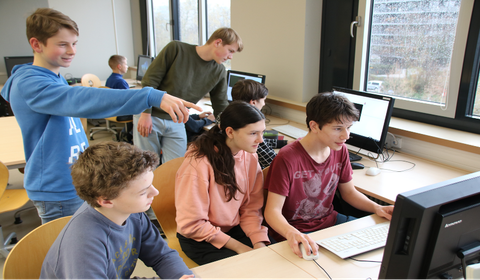Aug 09, 2024
Student Computing Center at TU Dresden offers computer science and electronics courses for students
The Student Computing Center (SRZ) at TUD Dresden University of Technology (TU Dresden) is a great opportunity for school students to test and expand their technical knowledge and thus pave the way for a successful future.
Well over 100 students have already signed up for courses at the Student Computing Center this school year, including many new and familiar faces. Stephan Hermsdorf, course leader at the LRC for 20 years and technician at the Faculty of Computer Science: "It's fun to work with the interested children and see the progress they make. We have also successfully taken part in various competitions as part of the courses. Many former course participants can be found again as students at the TU or as employees in well-known companies in the region."
For all those who missed the registration deadline, there is good news...
There are still places available for the following courses at the Student Computing Center:
The computer science preparatory course (Wed., 16:30 - 18:30 or Thurs., 16:00 - 18:00) aims to provide initial knowledge of computer science. What is programming, what can you do with images on a computer and how does the internet actually work? Pupils learn the first steps of programming in a playful way, edit images and
learn what HTML is, how to use it to design a website and what is important to bear in mind on the Internet.
In the annual Electronics 2 course (Thurs., 16:00 - 19:00) you will gain initial insights into digital circuit technology and learn how to work with modular systems. You should have a basic understanding of electronics. After a brief introduction to the
C programming language, electronic components will be controlled via the PC. This includes making LEDs flash or programming a stopwatch started by a light barrier, for example.
The annual Electronics 3 course (Thurs., 16:00 - 19:00) aims to establish the link between electronics and computer science. Sensors and actuators can be tested on a microcontroller using a developer board. Light and temperature sensors are also available. The control of LEDs as well as the control of a 7-segment display is discussed and an own character library is created on the graphic display.
Pupils who would like to combine programming and electronics are welcome to enrol in the robot control course (Fri., 15:00 - 17:00). The children learn basic algorithmic structures in a C-related language. They program sensors and actuators of an EV-3 robot and learn methods for efficiently solving robot programming problems.
Websites(www.srz.tu-dresden.de) of the Student Computing Center. Further information: Ms. Plünzke, Tel: 0351 4867-2634,

